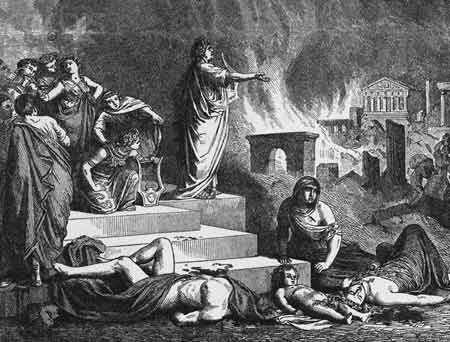“Let no one keep defrauding you of your prize by delighting in self-abasement and the worship of the angels, taking his stand on visions he has seen, inflated without cause by his fleshly mind, and not holding fast to the head, from whom the entire body, being supplied and held together by the joints and ligaments, grows with a growth which is from God.” Colossians 2:18-19
If only Christians paid closer attention to God’s Word, how much pain and bloody history would be avoided! The above caution from the Apostle Paul was written to a small group of “Christians,” as people were derisively calling them, because it meant “Baby Christs” or “Little Kings.” Paul preferred to call them “Saints,” which means something like “God’s Children.”
The above quote comes from a letter written to assemblies of Saints in the city of Colossae and neighboring towns, some with familiar names like Laodicea, Ephesus and others. The ruins of these cities are found in southern Turkey, so these were real people in real places. The assemblies had been established during Paul's Third Missionary Journey, and in the late 50s AD, Saints were gathering together in homes for fellowship. The excitement of seeing Jesus Christ conquering and rising from the grave, fully alive, physically intact, eating and drinking like anyone else, caused a tremendous stir across the whole Turkish peninsula, and across much of Palestine, Jerusalem, Greece, Macedonia, Egypt, and all the way into Rome itself. It also attracted the attention of money-makers, fakes, spiritual predators, cult leaders and the sordid characters associated with religion so familiar to us today.
The area of Turkey where Colossae was located was called the Roman Province of Asia Minor. It was a wealthy province, heavily engaged in East-West trade in the Roman Empire, perched at the edge of the Asian continent and the Indian subcontinent. It bordered the wealthy Parthenian Empire (Iran) and other great civilizations.
All of this background is important since Americans are living in a world similar to that of Paul’s audience. Our towns are bigger, the Christian audience is bigger, our technology is vastly more sophisticated, but Paul's message is relevant because the spiritual conditions are remarkably similar to those today. The wealth and benefits we enjoy from international commerce are much like the economic boom they enjoyed. But as it was then, today all our affordable consumer goods carry a hidden price tag which Paul warns about—the price of subjective, spiritual pluralism which accompanies internationalism and globalism. The world is, in many ways, flowing with spiritual sewage and violence related to religious zeal.
The biggest problem Paul saw came from people who claimed to know something about God and the spiritual realm based on their “visions” and personal experiences—highly subjective, unverifiable and wrong-headed ideas that can poison a person’s whole life. This problem must be emphasized before going on to share what actually matters about life and death, according to God’s Word. Our view of what matters in life and death should have little to do with our own personal, subjective experiences, although it is sweet when personal experience verifies what God’s Word says.
The Objective, Historical World
The 1st C was a remarkable time. Of course JC lived, died and resurrected from the grave in this century. Communications surged; in Alexandria, Rome, and all over the Empire, historical records, archives, and libraries were developed to preserve the historicity of this era. Palestine and Jerusalem, where JC lived and died, were incredibly famous in the 1st C, and their fame increased until the Jewish Wars of 70 AD. JC’s life did not unfold in some obscure, dark corner of the world—he lived in the cultural spotlight of the Roman Empire. Both Julius Caesar and Augustus Caesar held strong ties with the Herodian monarchy ruling in Israel, and Herod’s temple was one of the 7 Great Wonders of the Ancient World. All this spotlighting was, of course, tied to God’s purpose. Paul wrote, “While we were still helpless,
at the right time Christ died for the ungodly,”
(Romans 5:6) and “
When the right time came, God sent his Son, born of a woman, fulfilling the law” and centuries of prophecies concerning the coming “Messiah” (Galatians 4:4).

“The Roman historian Tacitus wrote that Nero was rumored to have sung about the destruction of Troy while watching the city burn; however, he stated clearly that this was unconfirmed by eyewitness accounts.” (
see History.com) The point? Historians were acutely aware of the distinction between rumors and eyewitness testimonies.
We know for certain that something remarkable occurred in Palestine at least several decades before 64 AD, when Nero blamed the fire in Rome on Christians. It means Christians were all over the place, especially in Rome, so Nero never had to explain what a Christian was. He knew many considered them obnoxious dissidents, so he blamed the fire (which he actually started, according to Tacitus) on Christians. He got away with the lie until his barbarous, savage slaughter of Christians became so repulsive that even those who despised Christians could endure it no more. Young Christians paid a terrible price simply for the joy of knowing JC: they received no material benefits, profits, women, or conquests from it. Enemies of Christianity, like Paul the Apostle was at first, miraculously switched from rabid hatred to zealous advocacy, receiving only persecution and ultimately execution as a reward. Why did Paul switch sides?
Something remarkable occurred in Palestine which changed world history!“The right time” meant that Christianity could spread like wildfire across the Roman Empire and beyond, riding on Roman Roads and “Common Greek,” which was the common language of the day. Most people at least spoke and understood Common Greek, so the Bible and especially the books of the New Testament were written in Common Greek, and needed very little translation for several centuries. It is in this objective, historical context we find the Bible standing like a pillar of sanity in an insane world. The Bible’s history has been cross-checked and verified against all kinds of secular, non-Christian historians and archeologists. Its message is intimately tied to famous, well-documented events and people known to secular history. Its reliability has been attacked from the beginning, questioned and assaulted, but verified and validated countless times for over 2000 years. Today the Bible’s reputation remains spotless, although skeptics will never admit it. In fact, the Bible’s reputation has endured long beyond the reputations of brilliant skeptics who have failed in assaulting its reliability, often disgracing themselves in the process.
The Subjective Spiritual World
Then there is the other side of spirituality—the subjective, crazy stuff. Tragically, Paul was imprisoned when he wrote to Colossae. He was frustrated because hideous charlatans and spiritual gurus were stirring up the region. Spiritual pluralism was warming up in the Mediterranean basin, where religions from across the Roman Empire and further east were blending into a mish-mash similar to modern, spiritual pluralism in the USA. Newly-constructed Roman roads were like today’s Internet, creating a tremendous surge of international trade, communication and cultural exchange. Since they lived at the disorienting cultural crossroads of the 1st C, it was imperative for Paul to save these young Saints from getting swept away by cultural confusion.
Along with this 1st C version of the Internet came a boatload of wacky, filthy and stupid ideas, just like the ones that come along with today’s Internet. That wacky boat was filled with people who had jumped on the new Christian "fad," mixed in their non-Christian ideas, and created a mess. This was happening in Asia Minor, in Colossae. The most common ingredient creating this new spiritual landscape came from travelling elites who claimed to have spiritual visions and visits from angels, which again is very similar to the New Age movement rising in the USA in the late 20th C.

The haunt of old men and rich tourists in Sedona, Arizona.
Today, "New Age" has turned Sedona, Arizona into a great “Crystal Vortex” tourist attraction. I visited there last summer with my son Kyle and a young friend, Ryan Yoerger. What an amazing place it was, filled with spiritual phenomenology and tourist traps! It was a blast. Confused, rich people from across the States wandered the streets seeking some kind of spiritual experience, shopping for exotic crystals, or, like Kyle and Ryan, jumping off cliffs into deep pools of water.

Did he check the water depth first? Oh to be young again!
I enjoyed visiting the crystal shops and learning about the amazing charms of these beautiful crystals. It was fascinating to eavesdrop on tourists discussing the power of these magic stones, which was new to me. Unfortunately, Kyle and Ryan were too creeped out by the magic stone shops to join me (they also preferred to eat after jumping off cliffs all day.)

I should have bought this for Darlene. She always wanted more serenity, creativity, and especially a connection with Atlantis.
Anyway, Paul was concerned: “Let no one keep defrauding you of your prize by delighting in self-abasement and the worship of the angels…taking his stand on
visions he has seen, inflated without cause by his fleshly mind,” he wrote. Sure enough, much of history is polluted by exactly these kinds of people hopping on the Christian train and distorting it. Most recently,
Joseph Smith founded Mormonism based on revelations and mysterious Golden Plates from the angel
Moroni, and Jehovah's Witnesses were founded by
Charles Taze Russell, who had great visions about the exact (wrong!) dates when JC would return.
David Koresh of the
Branch Davidian Cult in Waco, Texas based his teachings on such visions, and so did
Jim Jones, leader of the famous Disciples of Christ offshoot, the “People’s Temple”
cult where 918 people committed mass suicide in South America.
More famously,
Mohammad founded Islam based on conversations he had with an angel who called himself “Gabriel.” Despite the fact that Mohammad’s visions renounced the entire Bible from beginning to end—
including the books of Moses which Islam claims to revere—Islam is still considered a part of the Judeo-Christian family of religions. Mohammad taught that the original books of Moses were altogether different than the ones everyone else knows about. So in Islam, his visions and angelic discussions hold prominence over anything else ever known or written thousands of years before in the Bible.

Spiritual opportunities in Sedona, at discount prices!
The spiritual climate today is similar. Many people have their own personal versions of God and the Afterlife. These might be based on anything: casual conversations, feelings, dreams, or a mix of religions which are all thought to be the same (they really are night-and-day different from each other.) Polls show that most Americans think all religions lead to the same endpoint, although polls also show most Americans don’t really understand different religions. It is always possible to say all religions are the same if the most general ideas are compared—most religions talk about the Afterlife, morality, the spiritual world, and so forth, so they all address the same topics. However, they address the topics in completely different ways. To think all religions are the same is like thinking Republicans and Democrats are the same just because they address the same topics, like taxes, the military and social services.
Time to Die
When it comes time to die, death's doorstep is a bad place to hold beliefs based on fantasies or dreams, ideas and superstitions. Instead, it is hugely beneficial to understand what the Bible says, because the Bible has a record of astonishing reliability, historical accuracy, and most importantly, it is
the only book in world history where God speaks for God. Most people don’t realize that. Other venerated, holy scriptures openly acknowledge that God is not the one speaking. Eastern scriptures are the product of wise people and philosophers, so they claim. The Koran and the book of Mormon came from angels. Only in the Bible do we hear God Himself say, from the very beginning, in His own words, things like, “Let there be light!”
The Bible seems like a good place to start understanding death and the Afterlife, since God is the one describing it to humankind. Parts of it may be difficult to hear, but it also contains the sweetest promises and assurances found on the planet. For example, God says, “I will wipe away every tear,” and “men will hear of war no more.”
Returning for a moment to my own personal vision of the afterlife, it was most likely influenced by my knowledge of what the Bible says, which is good. In fact, all that matters is what the Bible says. It is nice if my personal, subjective experience correlates, but not essential. The few seconds in which I encountered this picture of the afterlife were tiny compared to the time I spent thinking about it, and especially tiny compared to the time I spent thinking about what God’s Word says. This more biblical view includes rather obvious facts like, “It is a terrifying thing to fall into the hands of the Living God.” No doubt it is disorienting. As I later thought about my brief glimpse of the afterlife, I knew the only thing I would be able to say on that day would be, “Does anyone know where Jesus is? I’m with him.” And I'd have to let the dice roll from there. To me, it seems that knowing about the historical JC and actually having a personal relationship with JC is a very good place to start when entering the confusing world of the Afterlife.
Entering the Afterlife
One place where my “vision” must be incomplete is the most immediate encounter we know the Bible says awaits those who love JC. “To be absent from the body is to be present with Christ,” it says in many different places and different ways. “We are of good courage, I say, and prefer rather to be absent from the body and to be at home with the Lord,” Paul writes in 2 Corinthians 5:8. “I am hard-pressed from both directions
, having the desire to depart and be with Christ, for
that is very much better,” he writes in Philippians 1:23. Jesus said in John 12:26, “If anyone serves Me, he must follow Me; and where I am, there My servant will be also…” And, “If I go and prepare a place for you, I will come again and receive you to Myself, that where I am,
there you may be also,” in John 14:3. Then again, “Father, I desire that they also, whom You have given Me, be with Me where I am,” he said in John 17:24 .
Repeatedly, the Bible says when those who love JC and follow JC die, they will meet JC, or “the Lord,” face-to-face first. This meeting is not like encountering the presence of the Almighty God, Creator of Heaven and Earth. Jesus, like us, had a human body. He would be highly compatible with bodies as we naturally understand human bodies.
The Bible maps out the scenario following death into the Afterlife. Saints who want to meet JC will in fact meet JC first, front and center, before anything else takes place. This must occur in some kind of timeless, unearthly, but entirely friendly way, compatible with the biblical descriptions. “If I go and prepare a place for you,” JC said, “I will come and receive you to myself.”
This is not heaven, but more of a landing zone specially prepared by JC for you and me. We'll spend time alone with him, talking and understanding what has happened, or didn’t happen; asking the questions we want answered, or asking about what’s going on with everyone left behind; talking about whatever we wish to discuss. Maybe centuries pass. It won’t matter because we are dwelling outside of space and time with JC, getting acclimated to what is happening, or is about to happen in this afterlife.
I am filling in the gaps to some degree, but this “Time with the Lord” helps explain the biblical Afterlife scenario. It also explains why Paul says to be absent from the body is to be with Christ, but also describes our immediate Afterlife experience as “sleeping”, like “Christ has been raised from the dead, the first fruits of those who are asleep” (see 1 Corinthians 15:20). There must be some kind of way in which we are with Jesus in a place prepared by JC for us, yet our bodies are not yet resurrected from the grave. Our bodily resurrection occurs later, at the time of the Great Rapture (1 Thes. 4:13-18).
I will further discuss this “Time With the Lord” and the continuing Afterlife scenario in my next blog.




